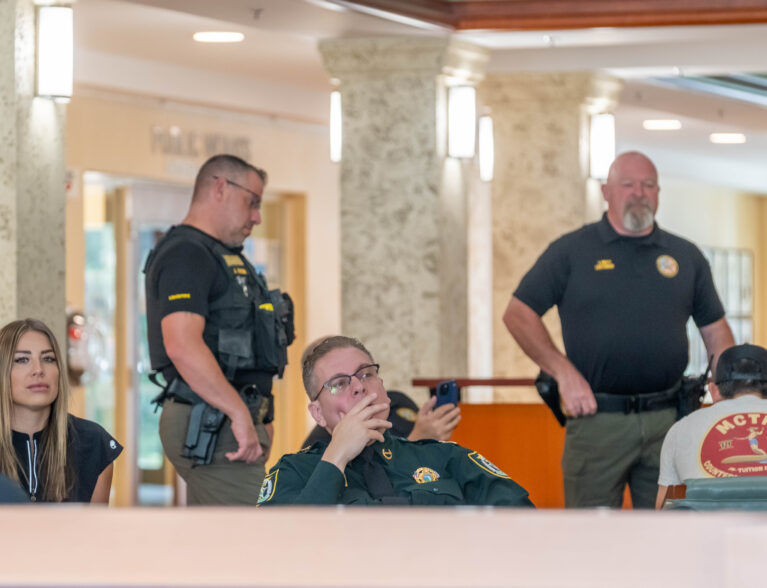
Sheriff Eric Flowers wants the County Commission to give him $94.3 million – a massive increase of nearly $15 million over his current budget – to fund his agency for the 2025-26 fiscal year.
And he’s not asking.
He’s demanding.
For weeks, in fact, Flowers has been publicly campaigning for his proposed budget, saying he must have the money for across-the-board, $10,000-per-year raises for his deputies, too many of whom he claims are leaving to take better-paying jobs with other area law-enforcement agencies.
He has indicated, in no uncertain terms, that he’s not willing to compromise on anything.
“Every year, we settle,” the second-term sheriff told the commissioners at their initial 2025-26 budget workshop earlier this month. “I’m done settling.”
It doesn’t seem to matter to Flowers that the commission has given his agency nearly $22 million in budget increases across the past four years – just under $19 million over the past three – with the understanding that a sizable chunk of those funds would go toward pay raises for his deputies.
Nor does he seem to care that commissioners, puzzled that the $50,600 starting annual salary for deputies remains noticeably below those offered by other law-enforcement agencies in the region, are questioning how those additional funds it gave the sheriff were allocated.
Flowers wants what he wants, regardless of the deleterious impacts that fully funding his proposed budget would have on taxpayers and the county’s ability to provide other services and pursue projects that improve our community.
The only way the commission could satisfy the sheriff’s demand would be to increase the county’s property-tax rate or significantly reduce its staff and level of service.
Apparently, that’s irrelevant to Flowers. He practically dared the commissioners to deny him the funding he says is necessary to provide the level of law enforcement the community desires, citing a Florida statute he said requires them to identify any specific items in his budget they believe can be cut.
“Put it in writing,” he said before his much-anticipated segment of the July 9 workshop ended in a stalemate, with an agreement only to continue the conversation.
You’ve probably gathered by now that Flowers, knowing the commissioners had no interest in raising the county’s tax rate, saw the workshop as an adversarial proceeding and arrived with a battle plan.
Flowers’ arrogant attitude, condescending tone and combative verbiage were obvious from the moment he stepped to the podium and told the commissioners his needs should get priority over all other county-funded agencies and departments.
The pomposity and swagger with which he prosecuted his case was what you’d expect from a wildly popular public figure whose community backing was unquestioned – not a politically damaged sheriff who eked out re-election last year despite being rejected by nearly two-thirds of the voters in the Republican primary.
But Flowers stayed with his script.
“We should not be the scraps at the end of the budget process,” he said. “We should be the first block that is laid before this county builds on anything else.”
He also stated smugly that Commission Chairman Joe Flescher, a former New York police officer who spent 10 years as a deputy here, and Vice Chairman Deryl Loar, who served 12 years as our sheriff before retiring from law enforcement in 2021, were too far removed from today’s policing tools and techniques to comprehend the need for his exorbitant budget proposal.
Flescher, by the way, is in his fifth term as a commissioner and participating in his 18th summer of evaluating sheriffs’ budgets.
“Everything we do has changed,” Flowers told them, referring to technological advances that include constantly evolving mobile phones, body-worn cameras, automated license-plate readers and real-time crime centers. “It’s completely different out there now.
“It’s a totally different job.”
As the session progressed, Flowers engaged in a shameless attempt to scare county residents into pressuring the commission to bow to his command, saying he cannot keep our community safe and protect our quality of life unless he gets every penny of the whopping 18.3-percent budget increase he’s seeking.
His melodramatic performance included warnings that the county will need to close parks and libraries because, without adequate policing, they’ll be overwhelmed by homeless people.
At one point during his opening statement, Flowers even said that not fully funding his budget would remove any need for new roads or other community-enhancement projects – because the resulting surge in crime will turn our county into Detroit.
“People will be moving away,” he told the commission, “if you don’t have the law enforcement that is necessary to protect the community.”
It was, indeed, pathetic political pandering. But Flowers, a former agency publicist, was playing to his strength: He speaks well, handles himself skillfully in front of the camera and is comfortable addressing audiences.
In this case, he was also playing with a stacked deck.
Flowers rallied his troops to the workshop, filling the chamber with deputies and other loyalists who fiercely embraced his take-no-prisoners presentation, creating the false impression that much of the community was in his corner.
The setting made it easy to produce well-choreographed theatrics that were punctuated by attention-grabbing sound bites and accompanied by arm-waving and shoulder-shrugging visuals, both of which were sure to play well on local TV newscasts and in video clips shared on social-media platforms.
Many of those sound bites contained a subliminal-but-unfair message: If the commissioners truly supported law enforcement, they’d give Flowers the money.
That didn’t sit well with the commissioners, all of whom champion law and order and faithfully align with the back-the-blue advocates who are a strong majority in our heavily conservative county.
Yes, the commission voted unanimously at the workshop to maintain the county’s tax rate – $3.55 per $1,000 of assessed property value – for the sixth consecutive year, ending any realistic chance that Flowers would get anything close to the nearly $15 million he wanted.
They did so for the right reasons, given the economic challenges faced by many in our community, particularly seniors living alone on fixed incomes.
“If you increase the millage rate, you’re going to create hardships for a sizable segment of the population that, in many cases, is already overburdened,” Flescher said.
“There was no interest in doing that,” he added.
County Administrator John Titkanich has presented for the commission’s approval a fiscally conservative budget – a tedious task when you consider Indian River has the seventh-lowest property-tax rate among the state’s 67 counties.
His work didn’t go unnoticed by the commissioners, especially Flescher and Loar, both of whom had been critical of his job performance in past months but praised his budget proposal.
And despite the commission’s commitment to not raising the tax rate, county homeowners will pay more in ad valorem taxes because property values increased.
Titkanich estimates those taxes will generate nearly $8.7 million in new revenue.
Even that amount, though, doesn’t come close to covering Flowers’ proposed budget increase, which would allocate $9 million for pay raises for deputies and the agency’s civilian staffers.
“Absent additional revenue,” the administrator said, “the alternative is deep cuts and risking service reduction in many areas – and it still will not yield enough revenue to fund the sheriff’s request.”
Titkanich, who recommended Flowers receive a $4.7 million increase that would put the agency’s 2025-26 budget at $83.6 million, cautioned the commission, saying the trajectory of the sheriff’s annual requests is “unsustainable.”
“Continuing on the sheriff’s trajectory, his budget will likely exceed $100 million next year and could hit $120 million by 2029,” he said, adding that Flowers’ current request, if approved, would consume 52.3 percent of the county’s proposed $157 million spending plan.
During a break in the workshop, Titkanich met with the sheriff’s budget team and found possible ways to improve the county’s offer – first to $5.7 million, then to $6.1 million.
Flowers refused to budge.
He also rejected Loar’s suggestion that a $6.1 million increase would allow the sheriff to boost deputies’ salaries by $9,800 and give $2,500 pay raises to the agency’s civilian employees.
“I am not there; I’m not going to get there,” Flowers said. “I asked for $14 million. There’s a reason for it.”
That reason might be a desire to make up for his past decisions to direct most of his pay raises to the agency’s upper echelon, including sergeants and lieutenants, rather than incrementally increase the starting salary for new deputies.
But Flowers, who last year based his request for a nearly 12-percent budget increase on a need to raise salaries, has sole discretion under state law over how the money he is allocated by the commission is spent.
Now, suddenly – despite receiving nearly $22 million in budget increases over the past four years – Flowers has decided increasing the annual base pay for new deputies to $61,600 is a priority.
“Why is starting pay so low?” Commissioner Joe Earman asked. “Why are we still at $50,000 in 2025? … I’m floored every time I see it.”
Flescher, Loar and Commissioner Susan Adams expressed a similar sentiment.
While Titkanich said last week he’s continuing to talk with the sheriff’s team in hopes of reaching an agreement this summer – commissioners also want Flowers to provide more budget transparency – the administrator stated flatly that he would not recommend any amount above $7 million.
“I’d prefer to stay at $4.7 million,” he added.
For those wondering: If Flowers is not satisfied with the budget approved by the commission, he may appeal to Gov. Ron DeSantis and his cabinet.
Now, though – as the governor seeks to reduce government spending and state lawmakers are looking to cut property taxes – probably isn’t the right time to go to Tallahassee.
Besides, he can only ask the governor for more money.
He can’t demand it.
Photos by Joshua Kodis






